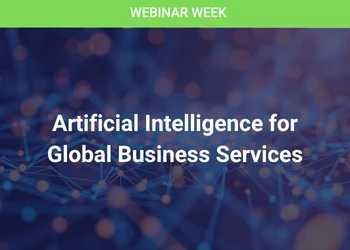A New Operational Model Enabled and Built by Intelligent Automation
Add bookmarkIntelligent Automation is Transforming Shared Services Operations
The business environment today is tough, challenging, and moving at exponential pace. But it's also full of opportunities.
Technology continues to drive the organizational change agenda, but now it's about making operations smarter and autonomous, defined primarily by the shift from humans consuming data, to machines consuming data. Farsighted companies are already recognizing the convergence of digital, robotics, analytics, and augmented intelligence into never before contemplated organizational models that build on the awareness generated by digital; leverage automation through robotics; and rethink processing with the help of machine learning and augmented intelligence.
As the technical landscape continues to expand, organizations are finding themselves on a transformative journey that started more than 50 years ago, with the first computer age. In the near future, they will learn to embrace machine learning and automation in ways never before possible. The lower cost of computing, storage, and bandwidth, alongside amazing new tools, are rapidly enabling a truly intelligent enterprise.
[inlinead]
The next chapter in digital transformation links what we have already learned about social, mobile, analytics, cloud, (SMAC) and Customer experience (CX), and will leverage this exponentially through intelligent, analytics-based, intelligence-driven automation. This requires a brand new way of thinking, however, and where the majority of organizations are still not connecting the dots is in recognizing that these free-flowing, all-encompassing, all-knowing tools no longer fit the formula of “developing a strategy – finding a vendor – implementing a solution.” That kind of finite thinking belongs to yesterday. To get the most out of today's opportunities you need to understand the convergence of technology and process in solving enterprise challenges.
“The truth is that despite all the reports around the value of digitalization, the vast majority of enterprises do not have a digital enterprise strategy nor a digital officer in place.”
Keith Strier, EY
How companies will set themselves up for success, in future, is by asking a completely different set of questions around how to meet their objectives. Enterprises not confronting the new disruptive reality are at great risk. The solution won’t be to adopt a "cognitive enterprise" strategy, but to recognize that the objectives should drive decisions. End-to-end business model transformation and “clean sheet” thinking are what’s needed. And these objectives are constant: being a great company, providing excellent customer experience, and delivering to shareholders. However, the path to achieving these is no longer a traditional roadmap based on sequential targets, but rather contingent on a culture of constant learning and discovery, and trying things out. The age of rapidly iterative experimentation is upon us. What that means, in effect, is that we need to embrace a new operating model.
This new operating model will be built on, and defined by, the new automation and intelligent technologies. While some have been talking about “digital” for years, early efforts did not really take off in large part because of needed advancement across a broad spectrum of technologies. Today, the convergence of capabilities needed to truly transform an enterprise are finally here and pressure from leading edge disruptors has created a demand for these foundational capabilities that is increasingly available and accessible to industry.
Executives who pursue AI for its own sake, however, are missing the point that its true value lies in helping to execute corporate strategy. The intelligent enterprise is not a “thing” per se, but rather a “way” of sustaining the constant adoption of change. The goal is not to deploy intelligent automation but to use it strategically to achieve enterprise goals.
***
This article is extracted from SSON’s Intelligent Automation Global Market Report 2017 H1.
Download the full report here.
[The H2 version of this report will be published in December 2017]



















